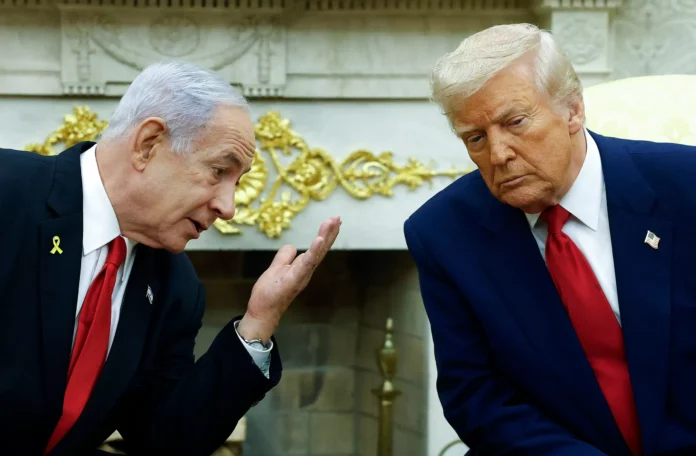In recent weeks, tensions between the United States and Iran have reached a boiling point. The failed nuclear negotiations and the subsequent dramatic appeals from Israeli Prime Minister Benjamin Netanyahu have laid the groundwork for President Donald Trump to potentially back a war with Iran. This move has sparked concern and fear among many, but it is important to understand the reasoning behind these actions and the potential consequences.
First and foremost, it is crucial to acknowledge the failed nuclear negotiations between the United States and Iran. The 2015 Iran nuclear deal, also known as the Joint Comprehensive Plan of Action (JCPOA), was a landmark agreement aimed at limiting Iran’s nuclear program in exchange for lifting economic sanctions. However, in May 2018, President Trump withdrew the United States from the deal, citing concerns over Iran’s compliance and the need for a stronger agreement. This decision has been met with criticism and backlash from the international community, particularly from European allies who still support the deal.
Since then, tensions between the United States and Iran have only escalated. Iran has resumed its nuclear activities and has been accused of attacking oil tankers in the Gulf of Oman. In response, the United States has deployed additional troops to the region and imposed further economic sanctions on Iran. This back-and-forth has created a volatile situation, with both sides engaging in aggressive rhetoric and actions.
Amidst this tense atmosphere, Israeli Prime Minister Benjamin Netanyahu has been making dramatic appeals to the international community, particularly the United States, to take a stronger stance against Iran. Netanyahu has long been a vocal opponent of the Iran nuclear deal and has repeatedly warned of the dangers of a nuclear-armed Iran. With the recent escalation of tensions, Netanyahu has seized the opportunity to push for a more aggressive approach towards Iran.
In a recent speech at the United Nations General Assembly, Netanyahu presented evidence of Iran’s secret nuclear program and called for the international community to take action. He also met with President Trump and other world leaders, urging them to take a tougher stance against Iran. These dramatic appeals have not gone unnoticed, and they have certainly caught the attention of President Trump.
It is no secret that President Trump has been a vocal critic of the Iran nuclear deal and has been looking for ways to exert pressure on Iran. With Netanyahu’s appeals and the failed negotiations, Trump now has the perfect opportunity to back a war with Iran. This move would not only align with his own beliefs but also appease his ally, Netanyahu, and potentially gain support from his base.
However, the consequences of such a decision must be carefully considered. A war with Iran would have devastating effects on the region and the world. It could potentially lead to a wider conflict, with other countries getting involved and innocent lives being lost. It could also have a severe impact on the global economy, as Iran is a major oil producer.
Furthermore, a war with Iran would only further destabilize the Middle East and potentially create a power vacuum that could be filled by extremist groups. It could also damage the relationship between the United States and its European allies, who still support the Iran nuclear deal and are against any military action.
In conclusion, the failed nuclear negotiations and the dramatic appeals from Israeli Prime Minister Benjamin Netanyahu have laid the groundwork for President Trump to potentially back a war with Iran. While this may seem like a tempting option, it is important to consider the potential consequences and the impact it would have on the region and the world. It is crucial for all parties involved to continue seeking diplomatic solutions and avoid further escalation of tensions. War should always be the last resort, and it is our responsibility to exhaust all other options before considering such a drastic measure.

